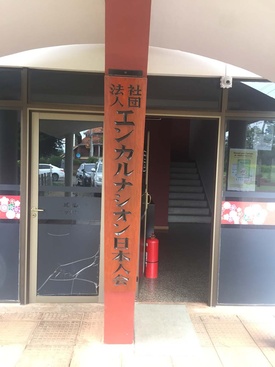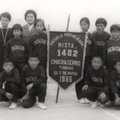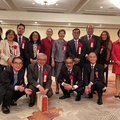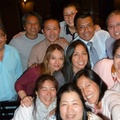It is Sunday in the Japanese Association of Encarnación, the third largest city in Paraguay, and a group of young Nikkei, divided into several teams, is playing a futsal tournament (one goalkeeper and four court players per side). The competitors reside in the department of Itapúa, where Encarnación is located.
There is a space for the sale of drinks. A refrigerator offers water, soft drinks and beers. So far, nothing unusual; The striking thing is that there is no one in charge of the sale. How does it all work then? It's simple: you go to the refrigerator, take the drink you want and leave the amount of the product in a little box next to it. Nobody looks at you, nobody controls you... and nobody takes a drink without paying for it or paying less than what is due. The system was implemented last year and its validity is proof that it works. No, there are no surveillance cameras. Honesty is cheaper and more effective than technology.
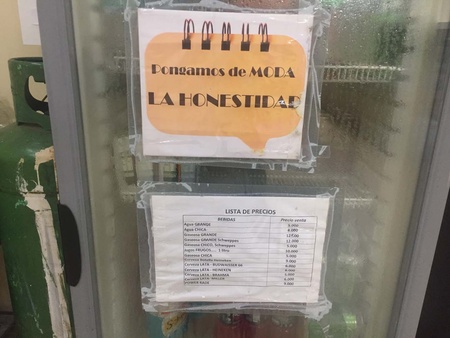
Two other things catch my attention.
During one of the matches, a player scores a goal, but immediately falls and suffers a blow or injury. Do not get up. The first one who runs to help him is not a teammate, but the rival goalkeeper, to whom he scored the goal. The goalkeeper does not ruminate about the goal against him, he does not recriminate his players, he does not reproach himself for not having been able to save the shot. As soon as his “executioner” falls, he is ejected to help him and arrives before anyone else. And he is not a relative, but an occasional adversary in trouble.
The goalkeeper's behavior reflects the family spirit, of communion, that I notice in the association, where everyone seems to take care of each other. Yes, I know that it is not the World Cup final, where no one gives themselves a millimeter of advantage, but the spontaneous gesture deserves to be highlighted. It's not common.
The other thing that catches my attention is that at the end of the day, while the winning team is awarded and the attendees begin to leave, a couple of young people in particular, of those who have played in the tournament, tour the premises of the association of a from one end to the other to collect the used chairs and store them in a kind of warehouse. I don't know if there is an agreement for them to do it or they take turns with others, but it seems to me that they do it spontaneously.
Needless to say, there is no trash lying on the floor. No soda bottles, no leftover bentos (sold for lunch), no napkins. When the curtain falls, the association's premises are as orderly and clean as before the championship began. They don't need cleaning staff or guards here.
I know it's a chimera, but I imagine this example replicated at a macro level, in the rest of society (or in a large part of it). We would not use so many resources, time and energy to ensure that no one steals or crosses the red light, to clean public spaces, to bring order, etc. All that flow of money or effort could have a better destination.
The Nikkei presence is not only felt in the association. A quick tour through the streets of Encarnación allows you to detect several commercial establishments (pharmacies, supermarkets, etc.) with Japanese names. Its owners are immigrants (or their descendants). Here, the Nikkei have a good image. Of responsible and disciplined people. And that is a plus, for example, to get a job. In some ways, being of Japanese descent means starting with a certain advantage.
The positive image extends to the studies. It is believed that a Nikkei, by the mere fact of being one, is intelligent... and good at mathematics. Something similar also happened before in Peru.
CLOSER TO JAPAN
Japanese immigration to Paraguay began in 1936, before World War II. It was paralyzed in 1941, in the middle of the war, and was resumed during the post-war period, already in the 1950s.
In Peru, on the other hand, the Issei migrated before the war. For this reason, those who by age in Peru are Nisei, in Paraguay (or in Encarnación) are Issei. And a Peruvian sansei is contemporary with a Paraguayan nisei.
I get the impression that while in Peru we emphasize our Nikkei status, in Encarnación they put more emphasis on Japaneseness. It's as if their ties with Japan were closer than ours (I imagine this is because Japanese migration to Peru is older). Even in the department of Itapúa there are colonies that preserve Japanese customs and language intact, as if a piece of Japan had been transplanted to Paraguay.
The majority of Nikkei in Itapúa are dedicated to agriculture.
Speaking of language, I think that is the main difference between the Nikkei communities of Paraguay and Peru. Here, everyone (or almost) speaks Japanese, even the youngest, while in Peru it is rare to find Nikkei who do. Thus, what is strange for the Paraguayan Nikkei is that a person of Japanese descent does not know nihongo. That's why they look at me strangely when they realize that I can only express myself in Spanish.
Now, in order not to look like a monolingual who leaves a poor image of the Peruvian Nikkei, I tell you that Japanese immigration to Peru is 120 years old, that the community is very organized, that it has a cultural center of about ten floors, a polyclinic , a clinic, etc., which - it seems to me - surprises them in a positive way. Of course, things change color when they ask about the former Nikkei president who is in jail.
To find out about Japanese migration to Paraguay, just Google. There we find data, dates, names. However, there is something that the internet does not give you but a face-to-face meeting does: the possibility of hearing first-hand from the protagonists of immigration.
An obaachan tells me that she arrived in Paraguay through Argentina in the 1950s and that she spent about a week at sea, on the ship that brought her from Japan. Because? Because the ship could not touch land due to—if I understood correctly—some revolts that were taking place in Argentina. They were times of Perón.
Another immigrant, who arrived in Paraguay when she was a child, remembers the obstacles that people from the Japanese colony had to face who married people who did not belong to them. Parental opposition was strong. Fortunately, as in Peru, times have changed.
He also tells me that there are Issei who mix Japanese, Spanish and Guaraní (the official language of Paraguay) in their speech, exchanging words from the three languages with total naturalness, like someone breathing. Even in rural areas they usually speak in Japanese and Guaraní, ignoring Spanish.
The very brief experience in Paraguay leaves me with the feeling that beyond what we can find by Googling, there is very little that we Nikkei from a Latin American country know about the Nikkei from another country in the region. In any case, nothing like face-to-face contacts, on-site visits, to get to know each other better.
Finally, although as a Peruvian Nikkei I identify in several ways with the Paraguayan Nikkei (because I feel that in some way the stories of their community are mine too), I believe that above and beyond our common Japanese origins, what unites us is our condition. of Latin Americans.
© 2019 Enrique Higa Sakuda


